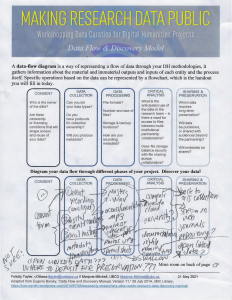What is data curation for digital humanists?
Data curation may have different meanings depending on your field of study, country, or organizational culture. For the purpose of this Primer, we use the Digital Research Alliance of Canada view that data curation is the active collecting of research data as it is created, maintained, used, archived, shared, and reused. Data curation is an iterative process with the ultimate goal of creating datasets that are FAIR (Findable, Accessible, Interoperable, and Reusable). Datasets with Indigenous ownership or origins should respect the CARE principles (Collective Benefit, Authority to Control, Responsibility, and Ethics) and any domestic principles established by First Nations, Métis, or Inuit Peoples in Canada (for example the First Nations principles of OCAP® (Ownership, Control, Access, and Possession)).
Research data curation management consists of multiple processes that are applied to your research project throughout its lifecycle. It includes collecting, documenting, storing, sharing, and preserving or the destruction or return of research data—now and in the future. Data curation is one very important process within the steps of research data management [Digital Research Alliance Primer: RDM].
Data management and curation are important processes for digital humanists, because, without proper planning and management, the value of the data as well as the labour involved in researching, collecting, and analyzing the data, could be lost either while the project is underway, or after, once it is sent off for preservation and sharing. An added benefit of data curation and management is that it makes your data easier for both you and your project collaborators to work with. Further, most funding agencies (including the Tri-Agency) require data management plans and data deposits that render research data FAIR (Digital Research Alliance of Canada, curation expert group). If you are working with data that has Indigenous ownership and origins, data curation is a crucial step towards respecting conditions of data governance.


